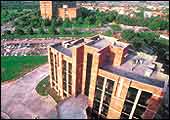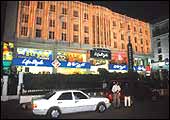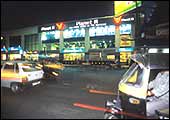|
The
future of cities is one in which cities don't exist. They will be
blown apart by the changes currently taking place. Cities have begun
to feel the forces of change spawned by new technologies. As the
internet grows in popularity as a way to shop and carry on business,
this could have dramatic results. The new technologies have already
made it easier for some businesses to relocate outside cities-drawing
many workers with them.
As shopping and working online become mainstream,
people may feel less inclined to travel to crowded business districts.
We are already seeing some routine workers, especially part-time
workers, working entirely from home or neighbourhood workstations.
All this may lead to a universal scattering of millions of villages,
giving individuals locally the comforts of village-scale life and
electronically the cultural richness of great cities.
Technology notwithstanding, cities offer services
and advantages that will continue to draw people. Whatever the future
may hold, today's cities are in trouble now. And no solution is
in sight for the massive problems of housing and sanitation for
the growing millions of urban poor. Nor has anyone come close to
finding a means to eliminate crime, environmental decay, or urban
pollution.
Just how fast are cities growing? Some estimate
that people are flocking to cities at the staggering rate of more
than a million a week. In developing lands more than 200 cities
now have populations that pass the million mark. Some 20 have reached
the ten million mark. And no slowdown is in sight. The massive inflow
of people often leads to high levels of unemployment and underemployment
because the market for labour may be unable to absorb the expanding
number of job seekers. Poverty can lead to crime. Large populations
also strain a city's ability to provide such basic services as water
and sanitation. Not to be overlooked either is the devastating effect
overpopulation often has on the local environment. Nearby farmlands
disappear as city boundaries expand.
Some would argue that governments should simply
funnel more money into their cities. But given the track record
that many governments, solving the problems of cities is not as
simple as writing out a check. Cities are made up of people, not
just buildings and streets. So, it is people who must change if
city life is to improve. The best economy of a city is the care
and culture of its people. And if drug abuse, prostitution, pollution,
environmental decay, social inequality, vandalism, graffiti, and
the like are to be eliminated, more is required than an increased
police presence or a fresh coat of paint. People must be helped
to make dramatic changes in their thinking and behaviour.
Effecting such change is beyond the capability
of humans. So attempts to solve the problems of today's cities-no
matter how well-intentioned they are-will ultimately fail. Students
of the Bible do not despair, however, for they see today's urban
difficulties as just one more example of man's inability to manage
our planet properly.
Chronicles Of Growth
Foretold
 |
| Mohali: Chandigarh's new sibling |
 |
| Hyderabad: Can it keep up its reputation? |
 |
| Pune: Now more than Mumbai's distant
cousin |
Pune. Chandigarh.
Hyderabad. A decade ago dynamic was a word that wasn't associated
with these cities. Somnolent, is more like it. Nothing really happened
here. Yet, there are today India's new breed of cities. What drives
people here?
Pune, now at one end of a six-lane expressway,
is poised to become an extended but more sophisticated and infinitely
cheaper suburb of Mumbai. The flash without the cash. Chandigarh,
a boring (it still is) government town is shaking off its stupor
to throw up tony clones like Mohali. With its wide, green spaces,
and new non-polluting industries, it a magnet to the northern professional.
Hyderabad isn't new, but its attitude is. Cleaned up, the great
mall of Hyderabad boasts of some of India's best shopping and job
opportunities. Much of Hyderabad's present has to do with its past:
apart from its energy, its reputation as an emerging tech-centre
is connected to the myriad government-run research establishments
dotting the city. Previously, these institutions were disconnected
from the private sector. But the coming of the infotech and biotech
revolutions have placed them in a symbiotic relationship.
With the white-collar job opportunities, are
coming the engines of growth-shopping malls, apartment complexes,
the demand for cleaner cities where the administration works. Chandigarh
and Hyderabad are showcases of what will happen in India's cities
of the future. As the population gains a voluble middle and upper
class, governments will have no choice but respond to demands of
a better, brighter city.
-Suveen K. Sinha
|

